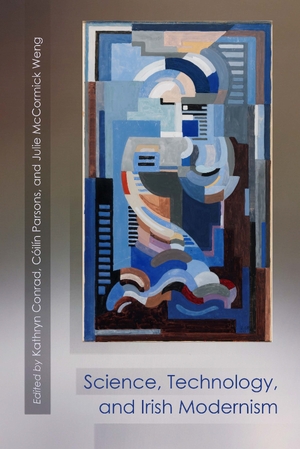"A thoughtful, well-conceived, and ground-breaking collection, and I applaud Conrad, Parsons, McCormick Weng, and the scholars they brought together for offering an exciting direction to studies of Irish modernism and the Irish Revival."—James Joyce Quarterly
"The kind of thorough, thought-provoking research we get throughout this volume will lead us away from excessive simplifications or stifling—possibly unsavory—stereotypes, and force us to reexamine the necessary generalizations we teach and think by."—Modernism/modernity
"Succeeds wonderfully in laying out a wide range of Irish interests in science and technology. This book will become a go-to resource for interested students and for scholars wishing to launch new inquiries into the relationship between Irish modernism and science and technology."—Michael Rubenstein, author of Public Works: Infrastructure, Irish Modernism, and the Postcolonial
"This pathbreaking collection reveals how science and the literary imagination, ‘intimate strangers’, are inextricably entangled in Irish modernism."—Ronan McDonald, The University of Melbourne
Description
Since W. B. Yeats wrote in 1890 that “the man of science is too often a person who has exchanged his soul for a formula,” the anti-scientific bent of Irish literature has often been taken as a given. Science, Technology, and Irish Modernism brings together leading and emerging scholars of Irish modernism to challenge the stereotype that Irish literature has been unconcerned with scientific and technological change. The collection spotlights authors ranging from James Joyce, Elizabeth Bowen, Flann O’Brien, and Samuel Beckett to less-studied writers like Emily Lawless, John Eglinton, Denis Johnston, and Lennox Robinson. With chapters on naturalism, futurism, dynamite, gramophones, uncertainty, astronomy, automobiles, and more, this book showcases the far-reaching scope and complexity of Irish writers’ engagement with innovations in science and technology.
Taken together, the fifteen original essays in Science, Technology, and Irish Modernism map a new literary landscape of Ireland in the twentieth century. By focusing on writers’ often-ignored interest in science and technology, this book uncovers shared concerns between revivalists, modernists, and late modernists that challenge us to rethink how we categorize and periodize Irish literature.
Table of Contents
Part One: Revival Dynamics
1. Natural History and the Irish Revival, Seán Hewitt
2. John Eglinton: An Irish Futurist, Julie McCormick Weng
3. The Easter Rising as Modern Event: Media, Technology, and Terror, Luke Gibbons
Part Two: Machine Fever
4. Infernal Machines: Weapons, Media, and the Networked Modernism of Tom Greer and James Joyce, Kathryn Conrad
5. Machinic Yeats, Gregory Castle
6. Accelerate: Why Elizabeth Bowen Liked Cars, Simon During
Part Three: Sounds Modern
7. Gramophonic Strain in Lennox Robinson’s Portrait, Susanne S. Cammack
8. His Remastered Voice: Joyce for Vinyl, Damien Keane
9. Broadcatastrophe!: Denis Johnston’s Radio Drama and the Aesthetics of Working It Out, Jeremy Lakoff
Part Four: Body Trouble
10. Corrigan’s Pulse, Medicine, and Irish Modernism, Enda Duffy
11. Sassenachs and Their Syphilization: The Irish Revival, Deanglicization, and Eugenics, Alan Graham
12. De generatione et corruptione: Samuel Beckett and the Biological, Chris Ackerley
Part Five: Strange Experiments
13. Science, the Occult, and Irish Drama: Ghosts in Yeats and Beckett, Katherine Ebury
14. The Uncertainty of Late Irish Modernism: Flann O’Brien and Erwin Schrödinger in Dublin, Andrew Kalaidjian
15. John Banville, Long Form, and the Time of Late Modernism, Cóilín Parsons
Notes
Bibliography
Contributors
Index
About the Author
Kathryn Conrad is associate professor and chair of the English department at the University of Kansas and author of Locked in the Family Cell: Gender, Sexuality, and Political Agency in Irish National Discourse.
Cóilín Parsons is associate professor of English at Georgetown University and author of The Ordnance Survey and Modern Irish Literature.
Julie McCormick Weng is assistant professor of English at Texas State University.
September 2019


